Find Help
More Items From Ergsy search
-
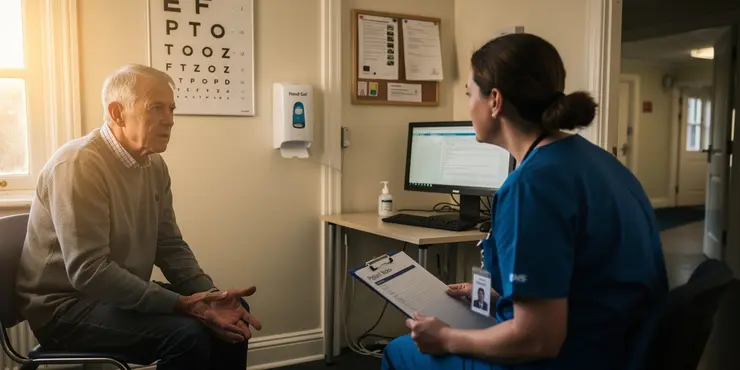
Causes of irritable bowel syndrome (IBS)
Relevance: 100%
-
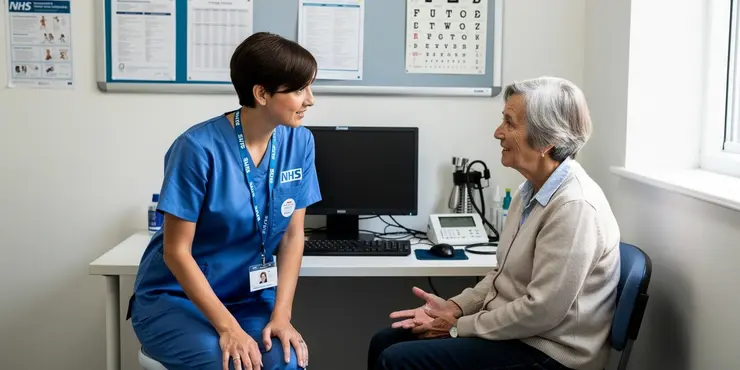
Causes of irritable bowel syndrome (IBS)
Relevance: 99%
-
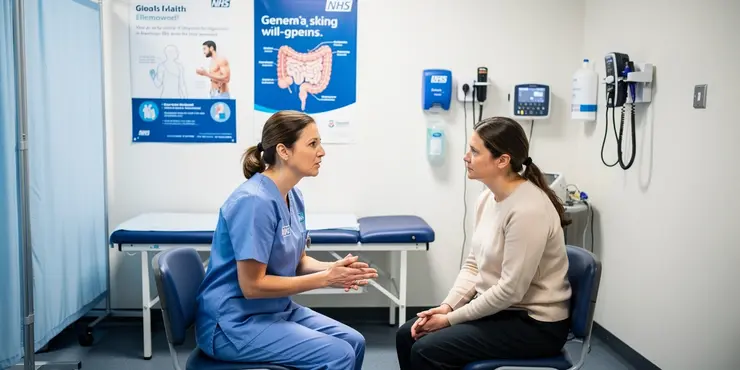
Symptoms of irritable bowel syndrome (IBS)
Relevance: 93%
-

What is irritable bowel syndrome (IBS)?
Relevance: 92%
-

About irritable bowel syndrome (IBS)
Relevance: 91%
-
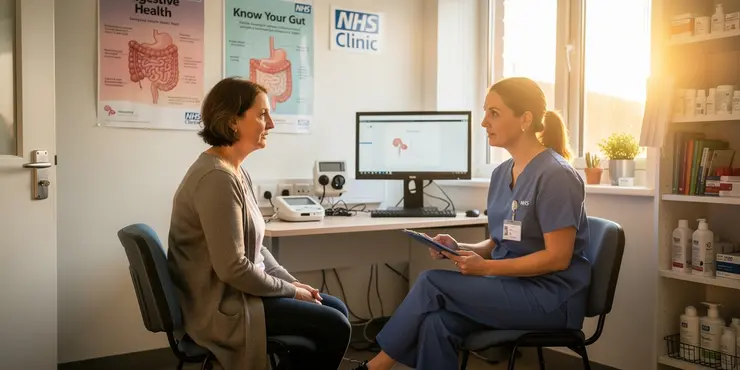
About irritable bowel syndrome (IBS)
Relevance: 90%
-

What is irritable bowel syndrome (IBS)?
Relevance: 90%
-

Diagnosing irritable bowel syndrome (IBS)
Relevance: 88%
-
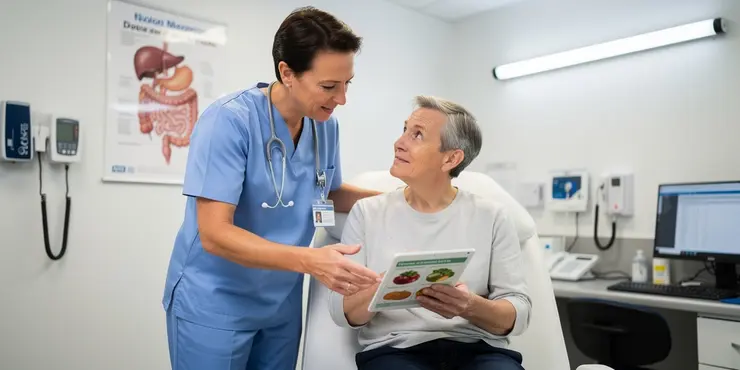
Treating irritable bowel syndrome (IBS)
Relevance: 87%
-

Treating irritable bowel syndrome (IBS)
Relevance: 81%
-

Symptoms of irritable bowel syndrome (IBS)
Relevance: 80%
-
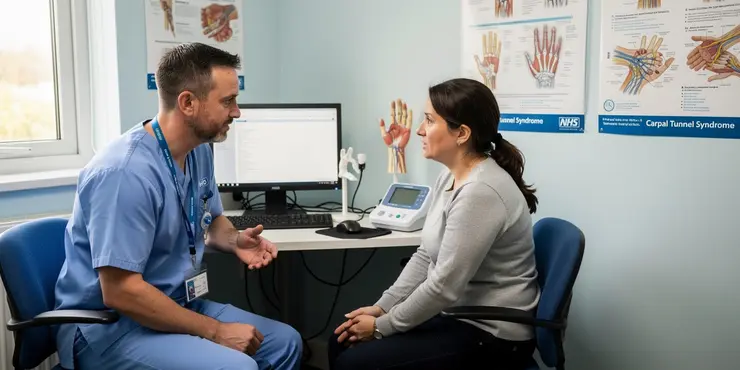
What causes Carpal Tunnel Syndrome?
Relevance: 49%
-

What causes chronic fatigue syndrome?
Relevance: 48%
-

What are the side effects of bowel cancer treatment?
Relevance: 45%
-

Taking a Genetic Family History - The Conversation (Bowel Cancer)
Relevance: 44%
-

How does family history affect the risk of bowel cancer?
Relevance: 43%
-

Why is there a surge in bowel cancer?
Relevance: 42%
-

What is Bowel Cancer?
Relevance: 41%
-
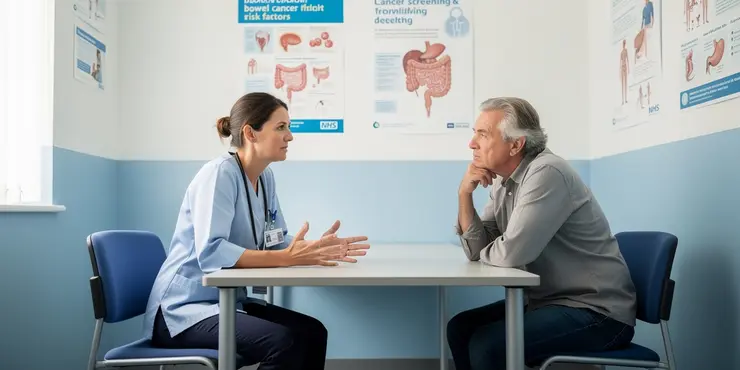
What are the risk factors for bowel cancer?
Relevance: 40%
-

Exercises for sciatica: piriformis syndrome | NHS
Relevance: 40%
-

What is Cushing's syndrome?
Relevance: 39%
-

Learn about bowel cancer (British Sign Language version)
Relevance: 38%
-

How common is bowel cancer?
Relevance: 37%
-
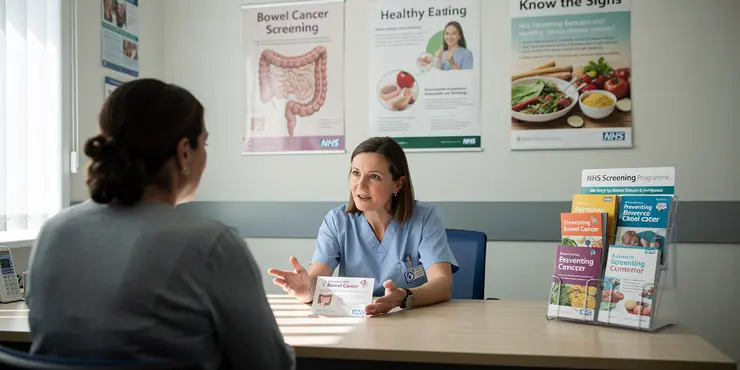
Can bowel cancer be prevented?
Relevance: 37%
-

Munchausen's syndrome | NHS
Relevance: 37%
-

Carpal Tunnel Syndrome
Relevance: 36%
-

Is chronic fatigue syndrome contagious?
Relevance: 35%
-

What factors are contributing to the increase in bowel cancer cases?
Relevance: 35%
-

Are younger people being diagnosed with bowel cancer more frequently?
Relevance: 35%
-
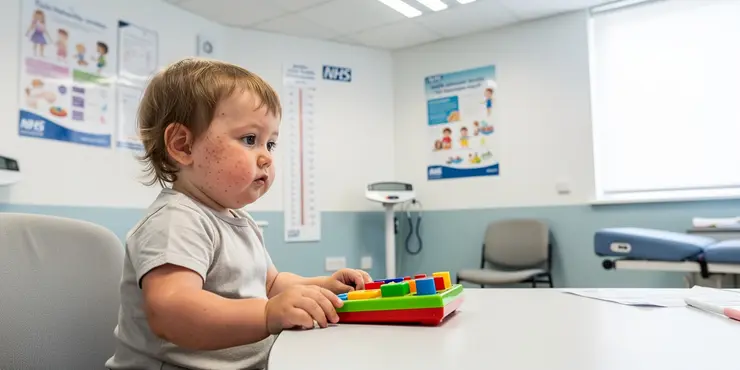
Prader-Willi Syndrome | NHS
Relevance: 35%
-

How is bowel cancer diagnosed?
Relevance: 35%
-

Charles Bonnet Syndrome
Relevance: 34%
-

IBS and your mind: Is there a connection?
Relevance: 34%
-

Causes of a sore throat
Relevance: 34%
-

What is complex sleep apnea syndrome?
Relevance: 34%
-

Bowel cancer - Symptoms and signs to look out for
Relevance: 34%
-

Is diet linked to the rise in bowel cancer?
Relevance: 34%
-

What is the survival rate for bowel cancer?
Relevance: 34%
-
What is chronic fatigue syndrome?
Relevance: 34%
-

Turner syndrome: Beyond the classic XO phenotype
Relevance: 33%
Causes of Irritable Bowel Syndrome (IBS)
Genetic Factors
Research indicates that genetics may play a role in the development of IBS. Individuals with a family history of IBS are more likely to experience symptoms themselves. Although the exact genetic markers have yet to be pinpointed, it's evident that familial trends suggest a hereditary component could be at play.
Diet and Food Sensitivities
Diet is a significant factor in IBS, with many sufferers noting that certain foods can trigger symptoms. Common culprits include fatty foods, dairy products, and certain vegetables like cabbage and broccoli. Food intolerances, such as lactose or gluten, can also exacerbate symptoms. The Low FODMAP diet is frequently recommended to help sufferers identify and eliminate trigger foods.
Stress and Mental Health
Psychological factors, such as stress and anxiety, have a strong link to IBS. The gut-brain axis, which is the communication network that links the gut and brain, plays a crucial role in this relationship. High levels of stress or mental health issues can increase the likelihood of IBS symptoms appearing or worsening.
Gut Microbiome Imbalance
The human gut hosts a complex community of bacteria known as the microbiome, which is essential for good digestive health. An imbalance in these bacterial populations can contribute to IBS. Factors such as antibiotic use, infections, or poor diet may lead to dysbiosis, a condition characterised by microbial imbalance.
Hormonal Changes
Hormonal fluctuations, especially in women, can influence IBS symptoms. Many women report worsening symptoms around their menstrual cycle, suggesting that hormonal changes play a significant role in the condition. The interplay between hormones and IBS is an essential area of ongoing research.
Infection and Inflammation
Gastrointestinal infections and inflammation are also linked to IBS. Following an episode of gastroenteritis, some individuals may develop post-infectious IBS. The inflammation from infections can disrupt the normal function of the gastrointestinal tract, leading to ongoing symptoms.
Conclusion
IBS is a multifactorial condition influenced by genetic, dietary, psychological, and environmental factors. Understanding individual triggers and factors contributing to your IBS can be essential in managing the condition. For residents of the United Kingdom, consulting with a healthcare professional can provide tailored advice and treatment options.
Causes of Irritable Bowel Syndrome (IBS)
Genetic Factors
IBS might run in families. If someone in your family has IBS, you might have it too. Experts think genes may play a part, but they're still trying to find out more.
Diet and Food Sensitivities
What you eat can affect IBS. Some foods might cause problems, like fatty foods, milk, and vegetables like cabbage. Some people can't handle things like lactose or gluten. The Low FODMAP diet can help find out which foods are a problem.
Stress and Mental Health
Feeling stressed or worried can make IBS worse. The gut and brain talk to each other, and stress can cause tummy troubles. When you are worried, IBS might get worse.
Gut Microbiome Imbalance
Our gut has good bacteria that help with digestion. If these bacteria get out of balance, it can cause IBS. Things like using antibiotics or eating poorly can upset this balance.
Hormonal Changes
Changes in hormones can affect IBS, especially for women. Many women feel worse around their period because of hormones. Scientists are learning more about how hormones and IBS connect.
Infection and Inflammation
Infections in the stomach can lead to IBS. After being sick with a stomach bug, some people get IBS. Inflammation from sickness can make the gut work differently.
Conclusion
Many things can cause IBS, like genes, food, stress, and illness. It's important to understand what triggers your IBS. In the UK, a doctor can help give advice and treatment that works for you.
Frequently Asked Questions
What is Irritable Bowel Syndrome (IBS)?
Irritable Bowel Syndrome (IBS) is a common gastrointestinal disorder that affects the large intestine, causing symptoms like abdominal pain, bloating, gas, and diarrhoea or constipation.
What are the main causes of IBS?
The exact cause of IBS is unknown, but it is believed to be related to factors like diet, stress, gut-brain interaction, bacterial overgrowth, food sensitivity, and genetic predisposition.
Can stress cause IBS?
Yes, stress is a significant factor that can trigger IBS symptoms. The gut and brain are closely connected, and mental or emotional stress can affect gut function.
Is IBS hereditary?
There is evidence to suggest that IBS can run in families, indicating a potential genetic component to the disorder.
Can diet trigger IBS symptoms?
Yes, specific foods and drinks can trigger IBS symptoms in some people. Common triggers include fatty foods, dairy products, alcohol, caffeine, and foods high in FODMAPs.
What are FODMAPs?
FODMAPs are short-chain carbohydrates that are poorly absorbed in the small intestine and can cause symptoms in people with IBS. They include certain types of sugars, fibers, and artificial sweeteners.
Can bacterial overgrowth cause IBS?
Small intestinal bacterial overgrowth (SIBO) has been linked to IBS. An imbalance of bacteria in the gut can lead to the symptoms associated with the disorder.
How is IBS diagnosed?
IBS is usually diagnosed based on symptoms and by ruling out other conditions. Doctors may use criteria like the Rome IV criteria and perform tests such as stool tests, blood tests, and colonoscopy.
Is there a cure for IBS?
There is no cure for IBS, but symptoms can be managed effectively with lifestyle changes, dietary adjustments, stress management, and medications.
Can hormonal changes trigger IBS?
Yes, hormonal changes, especially related to the menstrual cycle, can trigger or worsen IBS symptoms in women.
Does IBS lead to more serious conditions?
IBS does not lead to more serious conditions like colorectal cancer, but it can significantly impact quality of life. It is important to manage symptoms and consult a doctor for proper guidance.
What lifestyle changes can help manage IBS?
Lifestyle changes that can help manage IBS include maintaining a balanced diet, regular exercise, adequate hydration, and stress reduction techniques like mindfulness and relaxation exercises.
Are there any specific medications for IBS?
Medications for IBS may include antispasmodics, laxatives or anti-diarrhoeal drugs, and low-dose antidepressants to help relieve symptoms. It is essential to consult a doctor for a personalised treatment plan.
Can probiotics help with IBS symptoms?
Probiotics can benefit some people with IBS by restoring a healthy balance of gut bacteria, although their effectiveness varies from person to person. It is advisable to talk to a healthcare provider before starting probiotics.
Where can I find support and information about IBS in the UK?
Support and information about IBS can be found through organisations like The IBS Network, NHS resources, and consulting with healthcare providers. Support groups and online forums can also be helpful.
What is Irritable Bowel Syndrome (IBS)?
Irritable Bowel Syndrome, or IBS, is when your tummy hurts and feels funny. Your tummy might hurt a lot, you might need to go to the toilet often, or you might not need to go at all for a while. It can be hard to know when it will happen.
To help, you can:
- Eat healthy foods, like fruits and vegetables.
- Drink lots of water.
- Talk to a doctor if you feel really bad.
Feeling relaxed and calm can also help your tummy feel better.
Irritable Bowel Syndrome, or IBS, is a tummy problem that a lot of people have. It makes your big intestine hurt. You might feel tummy pain, have a bloated belly, lots of gas, or need to go to the toilet a lot with diarrhoea or feel blocked up with constipation.
Here are some tools and tips that might help:
- Talk to a doctor or nurse about how you feel.
- Keep a food diary to see which foods make you feel bad.
- Try to eat slowly and not rush your meals.
- When you feel stressed, try deep breathing or listen to calming music.
What makes IBS happen?
Doctors don't know for sure what causes IBS. But it might be linked to things like what you eat, feeling stressed, how your brain and tummy talk to each other, too many bacteria in your gut, being sensitive to some foods, and genes from your family.
Can stress make your tummy feel bad?
Yes, stress can make IBS symptoms happen. The brain and the stomach are connected. When you feel worried or upset, it can affect how your stomach works.
- Try to stay calm and relax.
- Talk to someone you trust if you feel stressed.
- Consider breathing exercises to help you feel better.
Can you get IBS from your family?
IBS means Irritable Bowel Syndrome. It is a tummy problem. We don't know for sure if you can get IBS from your family. Your tummy might feel bad because of other things too.
If you want to understand more, you can:
- Talk to a doctor or nurse.
- Look at pictures or videos about IBS.
- Ask a family member to explain it to you.
IBS might be something that happens in families, which means it could be passed down from parents to children.
Can food make IBS symptoms start?
IBS is a tummy problem that can cause pain, bloating, and other issues. Some foods can make these symptoms worse. It helps to know which foods might cause you problems. A food diary and talking to a doctor can be helpful tools.
Some foods and drinks can make IBS symptoms worse for some people. These can include things like fatty foods, milk products, alcohol, caffeine, and foods high in FODMAPs.
To help you eat better, try writing down what you eat and how it makes you feel. You can also use apps that track your meals and symptoms.
If you're not sure what to eat, a dietitian can give you advice. They can help you figure out which foods are okay and which ones to avoid.
What are FODMAPs?
FODMAPs are a type of food that some people find hard to eat.
If you have tummy pain or bloating, it might be because of FODMAPs.
Some foods with FODMAPs are bread, beans, and some fruits.
It can help to use picture cards or apps to remember which foods have FODMAPs.
FODMAPs are a type of sugar. Our bodies don’t digest them well. This can make people with IBS feel unwell. FODMAPs are found in some sugars, fibers, and sweeteners.
Can too many bacteria cause IBS?
IBS stands for Irritable Bowel Syndrome. It is a problem with your tummy.
Sometimes, there are too many bacteria in your tummy. This can make your IBS worse.
Talking to a doctor can help. They might give you medicine, or suggest special foods.
If you find reading hard, you can use audiobooks or ask someone to read to you.
Having too many germs in the small intestine is called SIBO. SIBO can make things like IBS happen. When there are too many or the wrong types of germs in the tummy, it can cause problems.
How do doctors know if someone has IBS?
Doctors ask you some questions about how you feel. They listen to your tummy. They might want you to take some tests to be sure. This helps them understand if you have IBS.
You can use a picture book or ask someone to help explain the questions and tests. A doctor or nurse can help you understand too.
Doctors find out if you have IBS by looking at your symptoms and making sure it is not something else. They use special guidelines called the Rome IV criteria and might do tests like checking your poop, blood, or looking inside your tummy with a camera.
Can you fix IBS?
IBS stands for Irritable Bowel Syndrome. It can make your tummy hurt or give you a funny feeling inside. Right now, there is no complete cure for IBS. But don't worry! There are ways to feel better:
- Eat healthy foods that are easy on your tummy, like bananas and rice.
- Try to stay away from foods that make your tummy feel bad, like very spicy foods.
- Drink lots of water every day.
- Exercise a little bit each day, like walking or playing outside.
- If your tummy still feels bad, talk to a doctor. They can help you find medicine or other ways to feel better.
Remember, doing these things can help your tummy feel happier! And if you need help, there are people who can help you learn more about IBS.
There is no cure for IBS, but you can feel better by changing how you live, what you eat, managing stress, and taking medicine.
Can changes in hormones cause IBS?
Sometimes, when the body makes different hormones, it can upset the tummy. This is called IBS.
If you think this is happening to you, you should talk to a doctor. They can help you feel better.
It might help to write down when your tummy feels bad. This can show if it happens at the same time as changes in hormones.
Ask a family member, friend, or carer to help you understand more. It helps to share how you feel.
Yes, changes in hormones, like those during a girl's period, can make IBS symptoms start or get worse for women.
Can IBS cause bigger health problems?
IBS is short for Irritable Bowel Syndrome. It's a belly problem that can make your tummy hurt or feel funny.
Most of the time, IBS does not cause bigger health problems. It can make you feel uncomfortable, but it usually won't lead to serious illnesses.
If you feel worried about your IBS, talking to a doctor can help. They can check how you’re feeling and give you advice.
Using tools like picture books or videos can also help you understand more about IBS. These tools can make it easier to learn and remember.
IBS is a tummy problem that does not cause cancer. But it can make life hard sometimes. It's good to talk to a doctor and find ways to feel better.
What can you change in your daily life to help with IBS?
IBS stands for Irritable Bowel Syndrome. It can make your tummy hurt. It can also make you feel like you need to go to the bathroom a lot.
Here are some easy changes to help:
- Eat healthy food like fruits and vegetables. Try to eat on a regular schedule.
- Drink lots of water. This can help your tummy feel better.
- Try to do some exercise like walking or playing outside. This can help your body feel good.
- Find ways to relax. You can listen to music or take deep breaths. This can help if you feel stressed.
You can also talk to a doctor or a dietitian. These people can help you find what works best for you.
You can feel better with IBS by changing some things you do every day. Eat a balanced diet with good foods, exercise regularly, drink enough water, and try to relax and not feel too stressed. You can use things like mindfulness or do relaxing exercises to help with stress.
Is there medicine for IBS?
If your tummy gets upset a lot (called IBS), there are some medicines that might help. These can be:
- Medicines to help your tummy feel less tight (called antispasmodics).
- Medicines to help you if you can't poop (called laxatives) or if you poop too much (called anti-diarrhoeal drugs).
- Medicines that can help make you feel a bit happier and calmer if your tummy trouble makes you feel sad (called low-dose antidepressants).
It's really important to talk to your doctor. Your doctor can make a special plan just for you to help with your tummy.
If reading is hard, you can ask someone to read with you or use audiobooks. If you can't see well, you can use large print books or a magnifying glass.
Can good bacteria help with tummy troubles?
Some people have tummy problems called IBS. Good bacteria, called probiotics, might help make the tummy feel better.
It's good to talk to a doctor or nurse before you take probiotics. They can tell you if it's a good idea for you.
You can find probiotics in yogurt or special drinks. They help keep the tummy happy.
Probiotics can help some people with IBS by making the bacteria in the tummy healthy again. Probiotics work for some people, but not everyone. It's a good idea to talk to a doctor before taking probiotics.
Where can I get help and learn about IBS in the UK?
If you have trouble with your tummy and think it might be IBS (Irritable Bowel Syndrome), there are places and people who can help you.
You can:
- Talk to your doctor. They can give you advice and answer your questions.
- Visit websites like the NHS. They have lots of information written simply so you can understand it.
- Join support groups where you can talk to others who have IBS too.
If reading is hard, you can ask someone to read the information to you or listen to audiobooks about IBS.
You can get help and information about IBS from places like The IBS Network and the NHS. You can also talk to your doctor or nurse. Joining support groups or talking to people online can also help.
Useful Links
This website offers general information and is not a substitute for professional advice.
Always seek guidance from qualified professionals.
If you have any medical concerns or need urgent help, contact a healthcare professional or emergency services immediately.
Some of this content was generated with AI assistance. We’ve done our best to keep it accurate, helpful, and human-friendly.
- Ergsy carfully checks the information in the videos we provide here.
- Videos shown by Youtube after a video has completed, have NOT been reviewed by ERGSY.
- To view, click the arrow in centre of video.
- Most of the videos you find here will have subtitles and/or closed captions available.
- You may need to turn these on, and choose your preferred language.
- Go to the video you'd like to watch.
- If closed captions (CC) are available, settings will be visible on the bottom right of the video player.
- To turn on Captions, click settings .
- To turn off Captions, click settings again.
More Items From Ergsy search
-

Causes of irritable bowel syndrome (IBS)
Relevance: 100%
-

Causes of irritable bowel syndrome (IBS)
Relevance: 99%
-

Symptoms of irritable bowel syndrome (IBS)
Relevance: 93%
-

What is irritable bowel syndrome (IBS)?
Relevance: 92%
-

About irritable bowel syndrome (IBS)
Relevance: 91%
-

About irritable bowel syndrome (IBS)
Relevance: 90%
-

What is irritable bowel syndrome (IBS)?
Relevance: 90%
-

Diagnosing irritable bowel syndrome (IBS)
Relevance: 88%
-

Treating irritable bowel syndrome (IBS)
Relevance: 87%
-

Treating irritable bowel syndrome (IBS)
Relevance: 81%
-

Symptoms of irritable bowel syndrome (IBS)
Relevance: 80%
-

What causes Carpal Tunnel Syndrome?
Relevance: 49%
-

What causes chronic fatigue syndrome?
Relevance: 48%
-

What are the side effects of bowel cancer treatment?
Relevance: 45%
-

Taking a Genetic Family History - The Conversation (Bowel Cancer)
Relevance: 44%
-

How does family history affect the risk of bowel cancer?
Relevance: 43%
-

Why is there a surge in bowel cancer?
Relevance: 42%
-

What is Bowel Cancer?
Relevance: 41%
-

What are the risk factors for bowel cancer?
Relevance: 40%
-

Exercises for sciatica: piriformis syndrome | NHS
Relevance: 40%
-

What is Cushing's syndrome?
Relevance: 39%
-

Learn about bowel cancer (British Sign Language version)
Relevance: 38%
-

How common is bowel cancer?
Relevance: 37%
-

Can bowel cancer be prevented?
Relevance: 37%
-

Munchausen's syndrome | NHS
Relevance: 37%
-

Carpal Tunnel Syndrome
Relevance: 36%
-

Is chronic fatigue syndrome contagious?
Relevance: 35%
-

What factors are contributing to the increase in bowel cancer cases?
Relevance: 35%
-

Are younger people being diagnosed with bowel cancer more frequently?
Relevance: 35%
-

Prader-Willi Syndrome | NHS
Relevance: 35%
-

How is bowel cancer diagnosed?
Relevance: 35%
-

Charles Bonnet Syndrome
Relevance: 34%
-

IBS and your mind: Is there a connection?
Relevance: 34%
-

Causes of a sore throat
Relevance: 34%
-

What is complex sleep apnea syndrome?
Relevance: 34%
-

Bowel cancer - Symptoms and signs to look out for
Relevance: 34%
-

Is diet linked to the rise in bowel cancer?
Relevance: 34%
-

What is the survival rate for bowel cancer?
Relevance: 34%
-
What is chronic fatigue syndrome?
Relevance: 34%
-

Turner syndrome: Beyond the classic XO phenotype
Relevance: 33%


